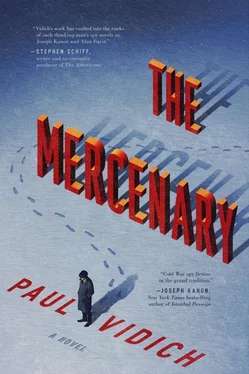“What did you find on Posner?”
She handed him a two-page document from her bag. “You’re allowed to read this, but you can’t take it. Orders.”
“Rositske?”
She shrugged but didn’t answer.
Garin scanned the two pages of background: Born October 5, 1938, Moscow. Father a NKVD lieutenant colonel, mother a commercial artist. Attended Moscow Elementary School 130, joined the Young Pioneers at age nine, and transferred to Komsomol at fourteen, becoming head of his high school unit. Entered the Institute of International Relations in 1958. Trained in the KGB institute, School 101, graduating fifth in his class. Served in London, Berlin, and Rome. Spoke fluent English and German.
Garin turned to the assessment section, written in the conversational style of a trained Agency analyst: “He has a fondness for money and material things, but he hasn’t shown a weakness for women, except the casual attention of a diplomat’s wife, and he doesn’t drink, except the odd glass of wine. He has a harmless, if slightly unusual, streak of vanity. During a posting in London, where his job was to interact with smart City types, he began to imitate their dress, wearing a Savile Row suit with a folded pocket square and a fashionable cravat tied in a Windsor knot. He also adopted a number of English social customs. He arrived at Kensington dinner parties with cut flowers for the hostess and he wrote thank-you notes afterward on monogrammed stationery.”
Garin pondered the profile of an elite KGB officer with Western affectations.
“I’ll introduce you,” Ronnie said. “He’s coming to the Spaso House gala next week.”
“What about the other thing?”
She pulled a lingerie box from her bag. “C cup, as you requested. It arrived in the pouch this morning. Who is it for?”
“Don’t reason the need.”
“Maybe it’s for you.” She smiled mischievously. “If that were true, it would put an end to all the other rumors. People have started to take an interest in you.”
Ronnie glanced back at the room of flushed faces engaged in animated conversations, everyone noting who was there and who was not. “Helen is looking at us,” she said, turning back to Garin. “Why is there no file on you in Langley?”
Garin never did answer her question. Helen approached and handed him his vodka martini.
Garin recorded the incident in his notebook that night. Too many people asking too many questions.
GARIN AND RONNIE STOOD IN a long security queue outside Spaso House, the US ambassador’s official residence at No. 10 Spasopeskovskaya Square, a graceful stucco building built in the final years of tsarist Russia. It had snowed that afternoon, the first big snow of March, which was an omen for a long winter.
Ronnie slapped her hands together for warmth and leaned into Garin. “Rositske will meet you in the bathroom when you’re inside. He has an answer for you.”
Garin had made Ronnie his drinking partner, and he relied on her to help him navigate the political shoals of embassy life. She nodded at the elegant guests impatiently enduring the cold, some sharing what little they’d been told to expect at the party and what they might actually see.
“A jazz band, seals, birds flying around,” Ronnie said to Garin, shivering. “I’ve been told it will be bigger than the party Ambassador Bullitt’s wife threw in 1935. Stalin didn’t come to that party, but he sent his defense minister, the foreign minister, top generals, and several Communist Party luminaries, including Karl Radek. Emily Propper wants to honor the fiftieth anniversary of that famous event—and outdo it.” Ronnie laughed.
Garin had heard the stories of the 1935 Spaso House party: ice blocks in the Chandelier Room, tame bears, birds landing on people’s heads. A German woman in a mink coat in front of Ronnie turned. “And did you know that the tame bear became drunk when Karl Radek gave it champagne?” she asked. Another guest pointed out the Spanish ambassador. And then a whispered rumor swept the queue: two members of the Presidium were coming.
Ronnie pointed to the front of the queue. “There’s Posner.”
A tall man without a hat wore a scarf tucked into his sable coat, and he allowed himself to be patted down by a marine guard. His salt-and-pepper hair fell back to his shoulders, like a flamboyant orchestra conductor, and his narrow jaw and aquiline nose, red from the cold, gave his angular face a pleasant appearance.
Garin had his eye on Posner when he gave his overcoat to the coat-check girl, who placed it among many others hanging on a wheeled rack. He moved to the Chandelier Room, where a perimeter balcony circled the cathedral ceiling and a glistening glass chandelier hung like a jeweled star. Everywhere, people milled, moved past the tame bear borrowed from the Moscow Zoo, or stared at the barking seal. A large, netted aviary of canaries and sparrows drew awed attention from arriving guests, and others ambled past a stand of white birches set in a meadow of tulips. Somewhere, a gleeful saxophone was paired with a mournful trumpet, accompanied by the nimble fingering of a pianist.
Garin pushed through the ballroom and made his way to the bathroom. He was standing at the urinal when he became aware that a man had entered. Garin moved to the porcelain sink, opening the hot and cold taps, and he felt the man’s presence at the next basin.
“What’s his name?” Rositske asked.
“He asked me not to share it.”
“You don’t work for him.”
“Actually, I do. Until it’s done.”
Rositske aggressively splashed water on his face. “Bullshit. You think he trusts you?”
“He’ll trust me more when I deliver the next batch of his son’s medicine. Where is it?”
“You’ll have it. When does he deliver again?”
Garin stared at Rositske through the mirror. “He’s not a banker. He doesn’t work set hours. He’ll get me the film when it’s safe.”
“Langley is pressuring me.”
Garin grunted. He glanced under the stalls to be certain they were alone. “The copier he uses is being watched. He thinks there’s a breach on our side.”
“We checked on Posner,” Rositske said. “He’s a throwaway. Ronnie will introduce you.” Rositske handed Garin a list of typed questions. “Langley wants these answered.”
Garin looked. “GAMBIT is already nervous. These will scare him off.”
“It’s not a suggestion. It came from POTUS to the DCI to Mueller to me, and now to you.”
“I don’t care who wants it.” Garin crumpled the paper. He dropped his voice. “He’s skittish. I’m not asking for much, just the modest use of good judgment. Wait until he’s across the border, then he can answer these, and every other goddamned question they’ve got. Tell Mueller there is a risk he will cut and run.”
Garin thought his caution was brutally obvious. That the acting chief of station did not speak Russian, or read it, was one of Garin’s gripes. Nothing had changed since his previous posting. Ambitious men dubiously equipped for sensitive assignments made errors of judgment that put lives at risk.
“I will bring the questions,” Garin said, uncrumpling the page. “I’ll ask how he wants to address them. It would be good if I got the second batch of medicine when I bring up the questions. He might be more inclined to cooperate.”
Garin never did present the questions to GAMBIT.
* * *
GARIN RETURNED TO the Chandelier Room and took a spot on the edge of the party, nursing his drink. He was both a lone man observing the room and an amateur actor trying to decide what role he should play. The two things—Garin the man and Garin the actor—did not quite go together. The actor seemed a bit too studied, the man cast as the awkward outsider. And the guests who noticed him didn’t know whether to sympathetically approach or to be wary of him. He had the loner’s fortitude for privacy and the detachment of a man who found it convenient to withdraw with a tall glass of vodka, which he had taken without olive or vermouth but still called a martini.
Читать дальше












